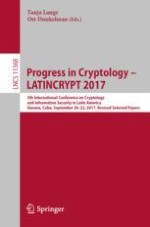2019 | OriginalPaper | Chapter
Concrete Efficiency Improvements for Multiparty Garbling with an Honest Majority
Authors : Aner Ben-Efraim, Eran Omri
Published in: Progress in Cryptology – LATINCRYPT 2017
Publisher: Springer International Publishing
Activate our intelligent search to find suitable subject content or patents.
Select sections of text to find matching patents with Artificial Intelligence. powered by
Select sections of text to find additional relevant content using AI-assisted search. powered by
